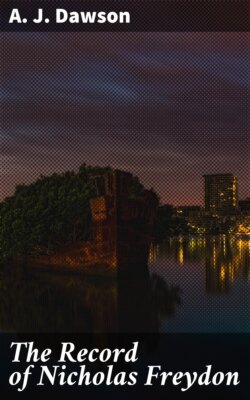Читать книгу The Record of Nicholas Freydon - A. J. Dawson - Страница 15
На сайте Литреса книга снята с продажи.
II
ОглавлениеNaturally, my father's suggestion, thrown out as it were in jest, whimsically, fired my fancy instantly. 'How glorious!' I said. 'But can we, really, father?'
It was less than a week later that we walked out of Werrina's one street into the bush to the westward of that township, accompanied by Ted Reilly and a heavily-laden pack-horse--Jerry. Ted was one of Werrina's oddities, and, in many respects, our salvation. The Werrina storekeeper shook his grizzled head over Ted, and vowed there wasn't an honest day's work in the man.
'What's the matter with Ted is he's got no Systum; never had since he was a babby.' (My thoughts reverted at once to a highly coloured anatomical diagram which hung in the cabin of the Ariadne's captain: the flayed figure of a man whose face wore the incredibly complacent look one sees on the waxen features of tailors' dummies, though the poor fellow's heart, liver, kidneys, and other internal paraphernalia were shamelessly exposed to the public gaze. The storekeeper's tone convinced me for the time that poor Ted had been born lacking some one or other of the important-looking purple organs which the diagram had shown me as belonging to the human system.) 'He's a here-to-day-and-gone-to-morrow, come-day-go-day-God-send-Sunday sort of a customer, is Ted--my oath! Wanter Systum. That's what I'm always telling 'em in this place. It's wanter Systum that's the curse uv Australia; an' Ted's got it worsen most. Don't I know it? I gave him a chanst here in my store. Might ha' made a Persition frimself. But, no; no Systum at all. He was off in a fortnight, trappin' dingoes in the bush, or some such nonsense. He's for no more use than--than a bumble bee, isn't Ted Reilly; nor never will be.'
Well, he was of a good deal of practical use to us, the storekeeper notwithstanding; but I admit that there was a notable absence of 'Systum' about the man. He was singularly unmethodical and haphazard, even as his kind go in the remoter parts of Australia. He made our acquaintance very casually by asking my father for a match, almost before we had descended from the coach outside the Royal Hotel, Werrina. (There was nothing royal, or even comfortable, about this weatherboard and iron inn, except its name.) And, oddly enough, my father fell into conversation with him, and seemed rather to take to the man forthwith.
I know it was by his advice, as kindly meant, I am sure, as it was shrewd, that my father said nothing to any one else in the township of his fantastic ideas regarding what we now knew to be the derelict Italian barque, Livorno, of Genoa. It was given out that we were going camping, between Werrina and the coast; and, no doubt my father was credited by the local wiseacres with the possession of some crafty prospecting scheme or another. Most of the folk thereabouts had been always wont to look to the bush (chiefly for timber) as a source of livelihood, but their attention was usually turned inland rather than seaward; for the bulk of the country between Werrina and the sea is poor and swampy, or sandy. The belt of timber we had seen behind our derelict's bay was not extensive.
It was Ted who bought Jerry for us for the modest price of £3, 15s.; and I make no doubt that serviceable beast would have cost my father £7 if he had had 'the haggling of it.' Pack-saddle and tent, with a number of other oddments, had come with us from across the Queensland border; first, by rail, and thence by numerous devious coach routes to Werrina. The only thing about our expedition which I think Ted really mistrusted and disliked was the fact that we set forth on foot. He told my father of horses he could buy, if not for three a penny, certainly at the rate of two for a five-pound note. (Animals no better, or very little better, are selling for £20 apiece in the same country to-day.) But my father spoke of the cost of saddlery and the like. He had been brought up in a land where horse-keeping means considerable expense, and the need for husbanding his slender resources was strongly foremost in his mind just now. But Ted had all his life long thought of horses as a natural and necessary adjunct to man's locomotion. I have seen him devote considerable time and energy to the task of catching Jerry in order to ride across a couple of hundred yards of sand to his favourite wood-cutting spot. To be poor, that is, short of money, was a natural and customary thing enough in Ted's eyes; but to go ajourneying as a footman suggested a truly pitiable kind of destitution, and did, I am convinced, throw a shadow over what otherwise had been the outset of a jaunt entirely after his own heart.
